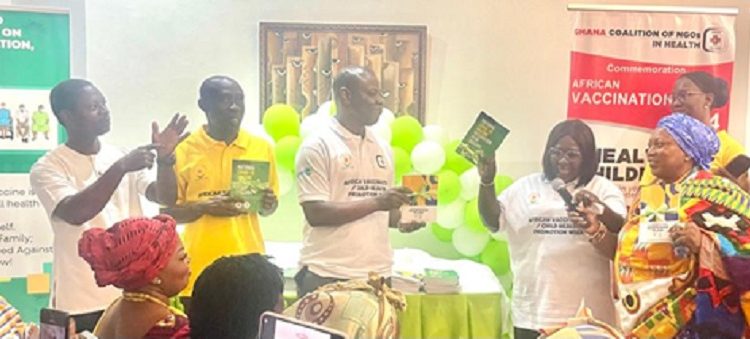Madam Frema Osei-Opare (2nd R) and other dignitaries with the new documents
The Ghana Health Service (GHS) has recorded a significant decline in infant mortality from 2014 to 2022.
Director General GHS, Dr. Patrick Kuma-Aboagye, who made the disclosure said the infant mortality rate for Ghana in 2022 stood at 28 deaths per 1000 live births, a 32% decline from the 2014 figure of 41 deaths per 1000 live births.
He attributed the decline to the comprehensive package of health interventions for children, including vaccination, growth monitoring, bed net distribution, de-worming and counseling sessions.
“It is an undeniable fact that immunization has played a critical role in this achievement,” he said.
He made the announcement at the launch of the 2024 African Vaccination and Child Health Promotion Week in Accra themed, “Healthy Childhood: Invest In Your Child for a Better Future”.
Deputy Program Manager of the Expanded Program on Immunization (EPI), GHS, Naziru Tanko Mohammed, said the country currently administered 11 vaccines against 14 VPDs in routine immunization.
He added that the EPI was considering establishing mobile vaccination centres in markets and public places to reach out to more children in urban centres.
He said although there is a significant coverage of childhood vaccines, there were some inequalities in peri-urban and urban districts.
He said in urban districts like Ga Central, Ablekuma, Oforikrom, Kwabrim, Prampram among others, parents hardly completed the vaccination schedules for their children.
“If you received only one dose of a vaccine which is to be administered in four doses, your child will still be at risk,” he said, encouraging such parents to ensure their children completed the process.
Chief of Staff, Mrs. Akosua Frema Osei-Opare, who launched the childhood vaccination week, said from the moment of birth, vaccines played a critical role in safeguarding the survival of newborns and infants.
“Through the routine immunization schedule, the country provides protection against diseases such as Tuberculosis, Diphtheria, Pertussis, Measles, Polio, Meningitis, Yellow Fever, Tetanus, among others,” she said.
Mrs. Opare said vaccination ensures that the youngest and most vulnerable population was shielded from dangerous diseases.
“Early vaccinations lay the foundation for a lifetime of health and well-being, setting the stage for future growth and development of a child,” she said.
She therefore called on the public to support the national vaccination efforts saying, “vaccination is not just an individual responsibility…it is a collective endeavor that benefits society. By achieving high vaccination coverage across all age groups, we create herd immunity.”
The Chief of Staff said the concept of herd immunity underscored the importance of investing in immunization to save lives and prevent outbreaks and that every family, group, and organisation had a stake in immunization and other child health interventions.
The event also witnessed the launch of two documents; Vaccine Related Events Response Plan and the National COVID-19 Vaccine Integration Plan (NACVIP).
It is envisaged that the plan of action would serve as the reference material and guide for all health sector stakeholders in its implementation and the strengthening of the whole health system.
The AVW is marked in April to strengthen immunization programmes in Africa by keeping immunization high on the national and regional agendas through advocacy and partnerships.
By Jamila Akweley Okertchiri


